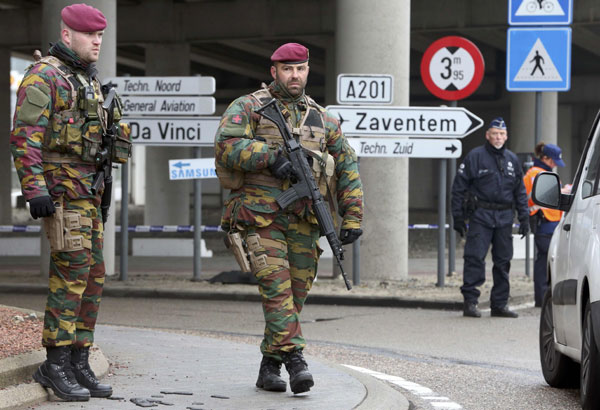Belgians identify two suspected bombers in Brussels blasts
(Agencies) Updated: 2016-03-23 15:24
 |
|
Belgian troops man a roadblock near Brussels' Zaventem airport following Tuesdays' bomb attacks in Brussels, Belgium, March 23, 2016.[Photo/Agencies] |
Security experts believed the blasts, which killed about 20 people on a metro train running through the area that houses EU institutions, were probably in preparation before Friday's arrest of locally based French national Abdeslam, 26, whom prosecutors accuse of a key role in the Nov. 13 Paris attacks.
He was caught and has been speaking to investigators after a shootout at an apartment in the south of the city a week ago, after which another Islamic State flag and explosives were found. It was unclear whether he had knowledge of the new attack or whether accomplices may have feared police were closing in.
Islamic State said in a statement that "caliphate soldiers, strapped with suicide vests and carrying explosive devices and machineguns" struck Zaventem airport and Maelbeek metro station.
It was not clear, however, that the attackers used vests. The suspects were photographed pushing bags on trolleys, and witnesses said many of the airport dead and wounded were hit mostly in the legs, possibly indicating blasts at floor level.
Officials said the final death tolls remained uncertain from the carnage in the morning rush hour, around 8 a.m. (0700 GMT) at the airport and shortly after 9 a.m. on the metro.
"A photograph of three male suspects was taken at Zaventem. Two of them seem to have committed suicide attacks. The third, wearing a light-coloured jacket and a hat, is actively being sought," prosecutor Frederic Van Leeuw told a news conference.
The two men in dark clothes wore gloves on their left hands only. One security expert speculated they might have concealed detonators. The man in the hat was not wearing any gloves.
"If you recognise this individual or if you have information on this attack, please contact the investigators," a police wanted notice for the third man read. "Discretion assured."
Islamic State warned of "black days" for those fighting it in Syria and Iraq. Belgian warplanes have joined the coalition in the Middle East, but Brussels has long been a centre of Islamist militancy.
About 300 Belgians are estimated to have fought with Islamists in Syria, making the country of 11 million the leading European exporter of foreign fighters and a focus of concern in France and other neighbours over its security capabilities.
"What we had feared has come to pass," said Belgian Prime Minister Charles Michel, vowing to face down the threat.
On Wednesday, he will host a prearranged visit by French Premier Manuel Valls, who declared: "We are at war."
Reviving arguments over Belgian policies following the Paris attacks, in which 130 people were killed in an operation apparently organised from Brussels, French Finance Minister Michel Sapin spoke of "naiveté" on the part of "certain leaders" in holding back from security crackdowns on Muslim communities.
Belgian Foreign Minister Didier Reynders retorted that each country should look to its own social problems, saying that France too had rough high-rise suburbs in which militants had become radicalised.
Life began to return to normal in Brussels on Wednesday, with some public transport working and cars returning to the European district, but the metro system remained closed and the airport was still shut to travellers.
- Czech Republic tightens security following Brussels attacks
- Premier Li mourns victims of Brussels attacks
- Police issue wanted notice for suspect after Brussels attacks
- Victims of Brussels attacks commemorated
- Britain beefs up security after Brussels attacks
- Brussels attacks 'not a surprise': UK security expert






